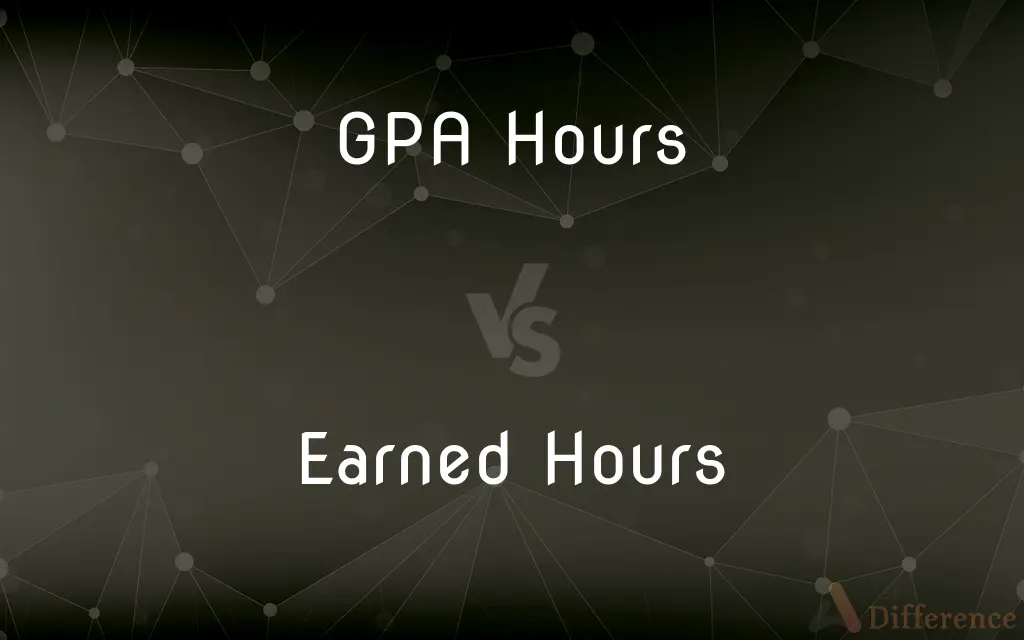GPA Hours vs. Earned Hours — What's the Difference?
Edited by Tayyaba Rehman — By Fiza Rafique — Published on December 6, 2023
GPA Hours are credit hours used to calculate the GPA; Earned Hours are the total credits successfully completed. Both are related to academic progress but serve different purposes.

Difference Between GPA Hours and Earned Hours
Table of Contents
ADVERTISEMENT
Key Differences
GPA Hours refer to the number of course credit hours a student has enrolled in and for which a grade is assigned that affects the Grade Point Average (GPA). On the other hand, Earned Hours encompass the total number of credit hours a student has successfully completed, regardless of the grade received.
When calculating the GPA, GPA Hours are crucial as they help in determining the weight of each course in the overall average. The grades associated with these hours contribute to the overall GPA. In contrast, Earned Hours simply tally up the number of credit hours for which a student received credit, including pass/fail courses or transfer credits.
It's possible for a student's GPA Hours to differ from their Earned Hours. For instance, if a student receives an 'Incomplete' or withdraws from a course, those credit hours may not be included in GPA Hours. However, once the course is completed and a grade is assigned, it could become part of the Earned Hours.
GPA Hours play a significant role in academic evaluations and honors, reflecting a student's performance in courses. Earned Hours, however, often dictate a student's progress toward degree completion and can affect class standing, graduation eligibility, and other academic milestones.
In summary, while both GPA Hours and Earned Hours pertain to a student's academic journey, the former focuses on performance metrics, and the latter emphasizes academic progression.
ADVERTISEMENT
Comparison Chart
Definition
Credit hours affecting GPA.
Total credits successfully completed.
Contribution
Determine GPA calculation.
Indicate progress toward degree.
Includes
Courses with grades that affect GPA.
All courses with credit, including transfer and pass/fail.
Implication
Reflects academic performance.
Reflects academic progression.
Potential Discrepancy
May not include incomplete or withdrawn courses.
Typically greater if there are transfer or pass/fail credits.
Compare with Definitions
GPA Hours
Course hours that impact academic performance metrics.
She focused on maximizing her grade in high GPA Hours courses.
Earned Hours
Hours credited toward a degree's requirements.
Her transfer credits added 15 Earned Hours to her record.
GPA Hours
Credit hours that count towards GPA calculation.
Her GPA Hours totaled 45 by the end of her sophomore year.
Earned Hours
Credit hours a student successfully completes.
By graduation, he accumulated 120 Earned Hours.
GPA Hours
The weighted hours in GPA computation.
Advanced courses often carry more GPA Hours than regular ones.
Earned Hours
Accumulated credits from all completed courses.
After two semesters, he had 30 Earned Hours.
GPA Hours
Hours of courses that receive a grade affecting GPA.
Despite taking extra courses, only 12 were GPA Hours.
Earned Hours
Credits acknowledged by an institution for coursework done.
Some of his elective courses didn't add to his major but contributed to his Earned Hours.
GPA Hours
Hours associated with courses graded for GPA.
Only the GPA Hours were considered for her academic honors.
Earned Hours
The total hours contributing to academic progression.
She checked her Earned Hours to determine her class standing.
Common Curiosities
Do transfer credits affect Earned Hours?
Yes, transfer credits usually add to Earned Hours but might not always contribute to GPA Hours.
What are GPA Hours?
GPA Hours are credit hours that count towards the calculation of the Grade Point Average.
What defines Earned Hours?
Earned Hours are the total credit hours a student has successfully completed.
Can a pass/fail course add to GPA Hours?
Typically, pass/fail courses don't add to GPA Hours but do count towards Earned Hours.
What's the significance of GPA Hours?
GPA Hours are vital for calculating a student's academic performance via their GPA.
Is GPA calculated using Earned Hours?
No, the GPA is calculated using GPA Hours, not Earned Hours.
What happens to GPA Hours if a course is retaken?
Policies vary, but typically, the new grade replaces the old one in the GPA Hours calculation.
Can Earned Hours affect class standing?
Yes, many institutions use Earned Hours to determine class standing (freshman, sophomore, etc.).
Are all completed courses part of Earned Hours?
Typically, yes, as long as credit is granted for the course.
Can GPA Hours and Earned Hours be the same?
Yes, they can be, but they may differ if certain courses don't count towards the GPA.
How can a student increase their Earned Hours?
By successfully completing more courses or transferring eligible credits.
Why are Earned Hours important?
Earned Hours show a student's progress toward completing their degree requirements.
Are withdrawn courses included in GPA Hours?
Usually, withdrawn courses are not part of GPA Hours unless a grade is later assigned.
How do institutions use GPA Hours and Earned Hours?
GPA Hours are used for academic evaluations, while Earned Hours track progress toward graduation.
If a student fails a course, does it add to GPA Hours?
Yes, the course would add to GPA Hours but might not add to Earned Hours.
Share Your Discovery

Previous Comparison
Excel Workbook vs. Excel Worksheet
Next Comparison
6 vs. 6XAuthor Spotlight
Written by
Fiza RafiqueFiza Rafique is a skilled content writer at AskDifference.com, where she meticulously refines and enhances written pieces. Drawing from her vast editorial expertise, Fiza ensures clarity, accuracy, and precision in every article. Passionate about language, she continually seeks to elevate the quality of content for readers worldwide.
Edited by
Tayyaba RehmanTayyaba Rehman is a distinguished writer, currently serving as a primary contributor to askdifference.com. As a researcher in semantics and etymology, Tayyaba's passion for the complexity of languages and their distinctions has found a perfect home on the platform. Tayyaba delves into the intricacies of language, distinguishing between commonly confused words and phrases, thereby providing clarity for readers worldwide.
















































